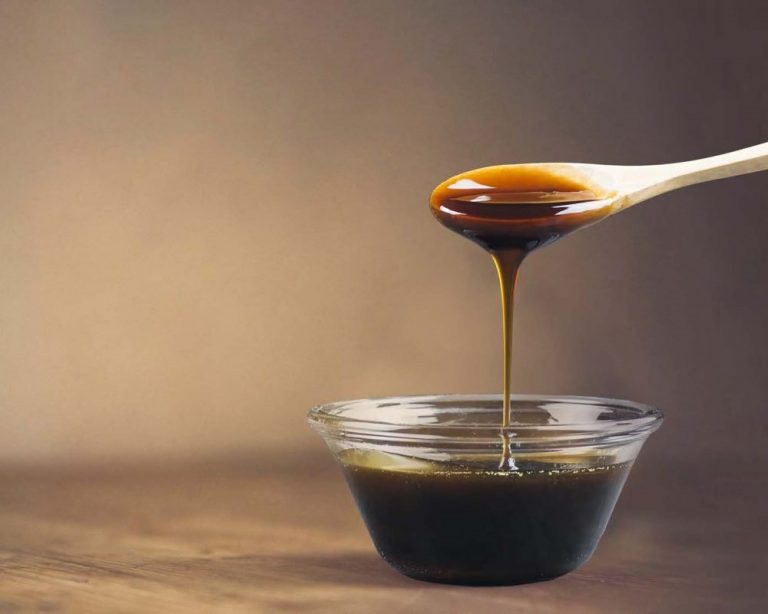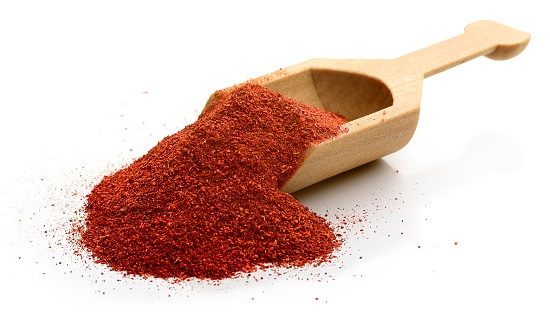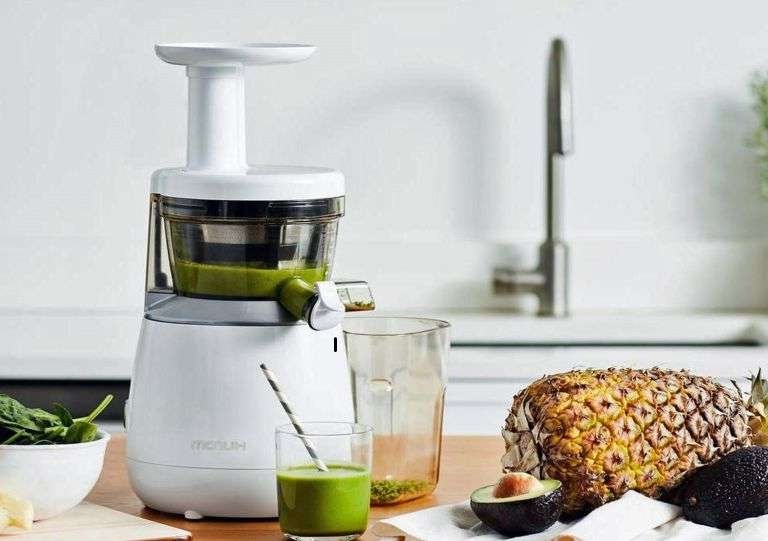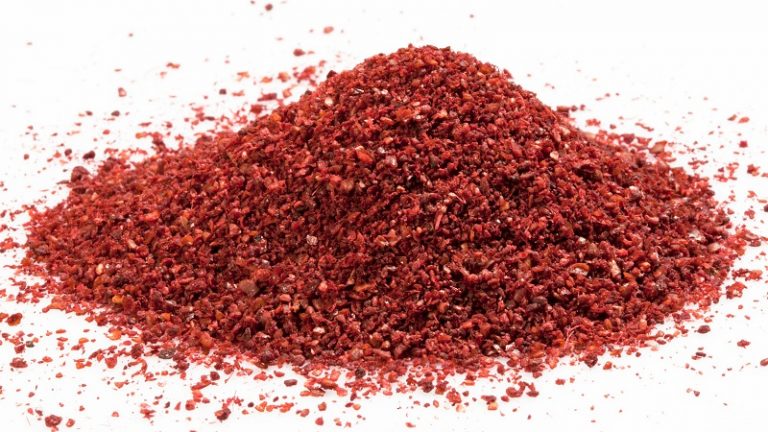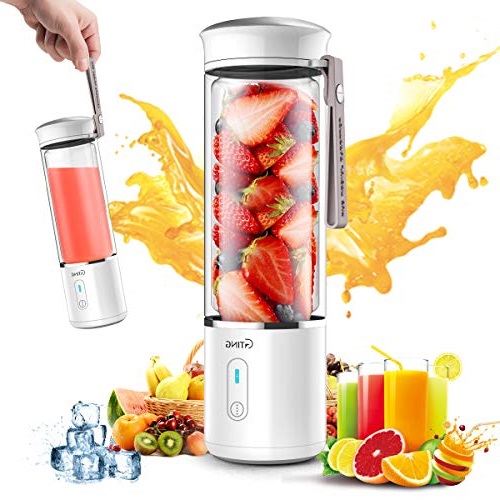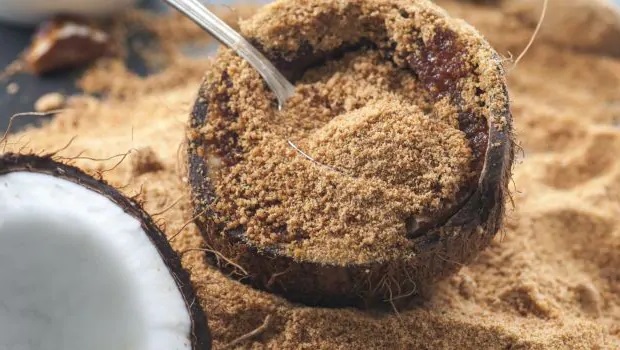Best Juicers for Pomegranate: How to Choose the Right One
Pomegranate juice is delicious and nutritious, but extracting the juice from the fruit can be a hassle. The seeds often get in the way, and getting all the juice out can be challenging. However, this process becomes much more manageable with a good pomegranate juicer.
Pomegranate juicers are explicitly designed to extract juice from pomegranates so that you can enjoy a quick and easy glass of fresh juice without any hassle.
When looking for the best juicers for pomegranate, you want to find one that will produce a high yield with minimal effort. It is important that it can handle all the small pieces and break through the hard shell so you can get good-quality juice.
In this article, we will provide insights that will help you pick the right juicer. We have reviewed many juicers for each category and selected the top picks.
Top Best Juicers for Pomegranate Reviewed
There are a variety of pomegranate juicers on the market, and we have a variety of options for you. We have you covered whether you’re looking for a high-end model or something more budget-friendly.
We also have a range of features to suit your needs. So, whether you’re just starting out or you’ve been juicing for years, we have the perfect pomegranate juicer for you.
Eurolux ELCJ-1700 Electric Citrus Juicer (Best Electric Juicer)
The Eurolux ELCJ-1700 Electric Citrus Juicer is a great choice for an electric juicer because it is compact and sleek. In addition, it has a built-in filter that helps capture skin, pulp, and seeds and is simple to operate.
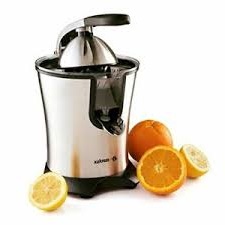
It is a great option if you’re looking to take some of the manual labor out of juicing. Just push down on the fruit with the citrus press and raise it up to stop to start juicing. The Juicer also has suction cups that add stability, making it easier for you to juice your fruits without making a mess.
However, it is smaller than most manual juicers and has a small juicing cone which means you might need to cut your pomegranate in halves.
Zulay Extra Tall Juicer (Best Overall)
The Zulay Extra Tall Juicer is our top pick because it is made with a nickel silver body, has an ergonomic handle and lever mechanism, and has a cone size of 5 inches. In addition, this juicer is easy to use and clean, making it the perfect option for those who are looking for a high-quality product.
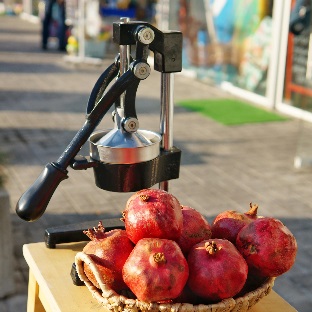
The Zulay extra tall juicer extracts juice quickly with little to no oxidation or heating. In addition, the pomegranate juice comes out pulp-free, ensuring that you get all the nutrients from the fruit. The juicer comes with two filters and one basic liner. The filter used with the liner also prevents seeds from going into your beverage, making it a great choice for those who want to avoid the hassle of spitting out seeds.
The Zulay Extra Tall Juicer has a simple design and easy-to-use operation. Additionally, the dishwasher-safe parts make cleanup a breeze. It stands out from the rest because it is a hand press commercial-grade juicer made of cast iron. This makes it durable and sturdy, perfect for those who want to make large quantities of juice at once. In addition, the juicer is compatible with 30 and 32-oz tumblers.
This juicer is perfect for those looking for a powerful and easy-to-use machine. It uses a commercial-grade hand press to crush the fruit easily and efficiently. The lever-action handle makes it simple to use, and the parts can be easily removed for dishwashing as they are dishwasher-safe for easy cleanup.
VIVOHOME
The VIVOHOME is a quality juicer made with stainless steel and cast iron construction. This makes it able to withstand everyday use and durable. Additionally, the juicer is designed to be safe and healthy, extracting the most nutrients from your fruits and vegetables.
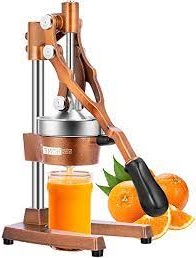
The VIVOHOME juicer is designed with your comfort and needs in mind. The ergonomically designed handle means you’ll get the most juice possible with the least amount of effort. Additionally, the heavy-duty base with suction legs provides further stability so that even the most vigorous juicing sessions won’t cause it to move around.
The VIVOHOME is a simple pomegranate juicer to operate. You have to cut the fruit in half and place it into the juicer. Then, press down on the handle to extract the juice. The juicer is made of high-quality materials, and it is very effective in extracting the purest juice. The cone and funnel parts are detachable for easy cleaning, and the unique and compact appearance makes it a great addition to any kitchen.
Tribest GSE-5010 Greenstar Elite Juicer
The Tribest GSE-5010 Greenstar Elite Masticating Juicer comes with some unique features. The Twin-Gear System is one of its most distinguishing and beneficial aspects as it helps extract more juice from fruits and vegetables.
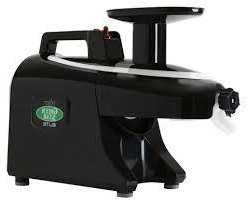
This juicer is a good option for those looking to make pomegranate juice. It extracts more juice than many other brands, and it has a higher price point. However, there are some drawbacks. One downside is that it’s harder to clean than other brands. Additionally, it can be challenging to use and requires some strength to operate. Plus, pomegranates need to have their arils removed before juicing; this juicer has an attachment for specifically juicing pomegranates. Overall, we don’t recommend it for beginners.
Zaksenberg Commercial Juicer (Best for Extraction)
The Zakksenberg Commercial Juicer is perfect for extracting the maximum amount of juice from fruits and vegetables. It has a large, robust design with a cast-iron enclosure that ensures smooth processing.
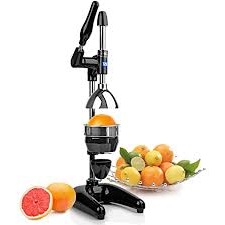
Additionally, there is no need to worry about any seeds or pulp getting in the way. Plus, the food-grade paint design ensures that you are getting a quality product.
The Zakseberg commercial juicer is one of the best pomegranate juicer machines on the market. It has a filter design that is 1 inch larger than any of its competitors, making it more efficient at extracting juice from pomegranates. In addition, it is FDA approved, meaning that it meets the highest safety and quality standards.
It is easy to use and handle and has stable performance. In addition, it extracts juice without pulp or seeds. The juicer also has a sturdy design that makes it durable for long-term use.
Tribest Pro MJP-105 XL Professional Manual Juicer (Most User-Friendly)
The Tribest Pro MJP-105 XL Professional Manual Juicer has many features that make it user-friendly. The strainer and bowl are both made of stainless steel, making them easy to clean. In addition, the juicer can be unlocked with a twist, which makes it easy to maneuver.
It is easy to set fruit on top of the cone and then press it down with your hands. Additionally, this juicer has a winch that allows you to push the dome towards the cone, making it even easier to use.
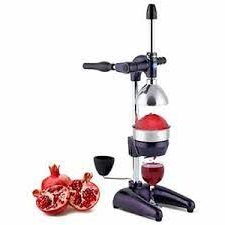
This juicer has a drip cup that can be quickly swung into place below the funnel to prevent the juice from pouring onto your kitchen countertops. Additionally, you don’t need to do anything manually before use – it’s very straightforward. The juicer is durable, sturdy, and reliable, perfect for everyday use.
LavoHome Pomegranate Juicer Commercial (Best Cast Iron Juicer)
The LavoHome Pomegranate Juicer is a high-quality machine with several features to improve your juicing experience. For example, the dishwasher-safe detachable components make it easy to clean, and the steel pieces that smash the fruits are on the inside of the juicer, whereas the cast iron frame is on the outside. This protects the steel pieces from wear and tear.
The LavoHome Pomegranate Juicer uses up to 14000 pounds of force to extract juice from the fruit. The comfortable grip generates power, and the frame with three pivot points allows for maximum pressure with little effort. Metal edges completely shroud the black color.
The LavoHome Pomegranate Juicer is made entirely of metal and is a sturdy, cast iron juicer. It is perfect for juicing smaller pomegranates, but larger ones do not work as well. This commercial-grade juicer will last a long time with proper care.
Omega NC800 Juicer
The Omega NC800 Juicer is a great choice for people who want to juice all sorts of fruits and vegetables. The adjustable end-cap means that you can juice soft or hard produce without any trouble, making it a versatile option for those who want to get the most out of their juicer.
The juicer is a versatile machine that can do more than just juice pomegranates. With its large food chute, it can easily accommodate the pomegranate seeds. Additionally, the juicer can be used to juice leafy greens, make a glass of fresh celery juice, and supplement your diet with fresh fruit and vegetable juices on a daily basis.
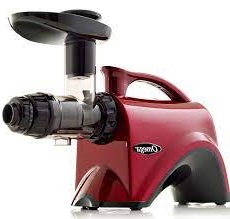
The slow-speed motor operates a single auger that slowly masticates the arils to extract the juice. Additionally, the Omega NC800 uses three different stages to help grind ingredients thoroughly and extract all the juice, yielding more juice in the process. As a result, it can efficiently process pomegranate without adding any extra heat or excessive friction that could damage the healthy properties of the super fruit.
The Omega NC800 is a horizontal single-auger juicer that is easy to clean and disassemble. It has only a few parts, which makes it easy to use. In addition, the quality of the juice produced by this juicer is better than electric citrus juicers. This is because the Omega NC800 breaks down the pomegranate rind to avoid bitterness in the juice.
However, it does have a few downsides. First, it doesn’t work as well on vegetables like tomatoes and soft fruits. Second, the auger has trouble getting the meshy pulp out. Finish by juicing a harder ingredient to push out the remaining juice from the fine mesh screen. Third, many of the juicer parts are made of plastic, which may affect their durability. Four, the arils need to be removed from the main fruit before juicing them. Finally, the juice will be milkier than with other juicers because it’s unfiltered.
The Omega NC800 juicer has a 15-year limited warranty, which is one of the longest in the industry. Finally, the Omega NC800 is a great choice for anyone looking to make delicious and nutrient-packed pomegranate juice.
Switol Manual Citrus Juicer
The Switol Manual Citrus Juicer is a great option for getting the most out of their fruit. It has a screw that extracts the juice until the last bit of fruit is gone, so you don’t have to worry about wasting any.
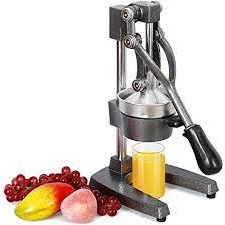
This juicer is a hand-operated one and is made of stainless steel and cast iron. This juicer is easy to use and takes less than 2 minutes to make a whole glass of juice. It is a great option for those who are looking for an easy-to-use juicer. In addition, all of the parts are dishwasher safe, so cleanup is a breeze.
Breville 800JEXL Juice Fountain Elite Centrifugal Juicer
Breville juicers are some of the most popular and well-reviewed on the market. They’re easy to use, fast, and produce delicious juice. The Breville 800JEXL Juice Fountain Elite Centrifugal Juicer has a 1000-watt motor that spins up to 13,000 RPMs, making it one of the most powerful juicers around. Additionally, its 40,000 filter pores make this model ideal for minimal waste.
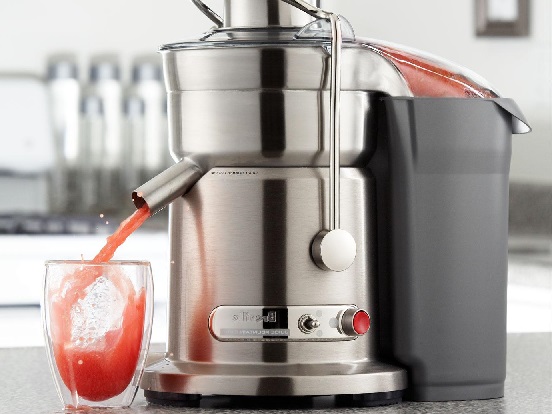
The juicer is a great appliance for the avid cook who lives their life on the go. The 3-inch feed extra-wide chute lets you juice whole fruits and vegetables in seconds to get your day started right. Additionally, the appliance features a 35.2 fl oz container that separates from a 3.2 qt pulp container- perfect for those who want to make large batches of juice at once!
It has low-speed and high-speed settings as well as the ability to refrigerate after juicing due to being dishwasher safe. Plus, it’s easy to make fresh juice at home with this juicer. So, if you’re looking for a tried and true product, the Breville Juice Fountain Elite Centrifugal Juicer is a great option.
Crystalia Pomegranate 2-in-1 Squeezer and Juicer
The Crystalia Pomegranate 2-in-1 Squeezer and Juicer is explicitly designed for pomegranates. Other juicers get only a portion of the juice from pomegranates, but this juicer comes with a 2-in-1 tool that functions as a seed remover and juice extractor. This ensures that you get all the juice out of the pomegranate fruit.
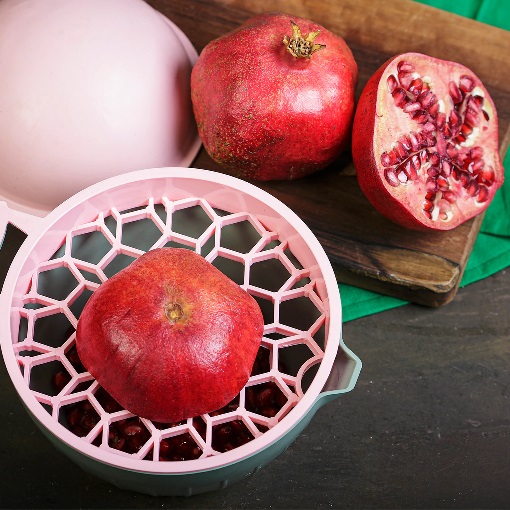
The tool’s sharp edge easily penetrates the fruit’s skin, allowing both the juice and seeds to be extracted. Additionally, the juicer can handle most citrus fruits with ease. The Crystalia Pomegranate 2-in-1 Squeezer and Juicer is a handy kitchen tool that comes with a reamer attachment on the base that catches the juice and seeds and dedicated holes in the reamer to allow the juice to reach the bottom while catching the seeds and other waste.
Oldpapa Upgraded Manual Citrus Juicer
The Oldpapa Upgraded Manual Citrus Juicer is designed to extract the maximum amount of juice from citrus fruits. This juicer is made with an aluminum alloy body that can stand up to years of use. It also has an ergonomic shape that fits your hand’s palm, making it easy to use.
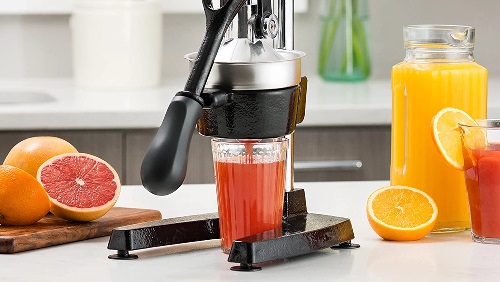
This juicer is perfect for those who are looking for a simple, easy-to-use option. The screw on the side lets you adjust the size of the juicer to work with your fruit, and the built-in liner keeps seeds and peels out of juice. Additionally, it comes with removable parts for easy cleaning.
The juicer parts consist of the extractor, base with a funnel, filter, and pulp catcher. All of which can be easily washed in the dishwasher separately. Additionally, the surface is aluminum coated to make it easier to clean. The juicer is easy to operate- you just have to press the fruit against the unit’s cone. Plus, it has an upgraded capacity that allows you to extract more juice from your fruit and a removable liner that protects the juicer from damage.
This juicer machine is cost-effective and can be used to extract juice from a variety of fruits. In addition, it contains customer care executives who are responsive and assist clients when they get stuck.
Stainless Steel Electric Citrus Juicer
This electric citrus juicer is a great option for those looking for an easy-to-use and lightweight juicer. It is made of stainless steel and ABS plastic, so it is durable and easy to clean. In addition, the 160-watt and 120-volt motor can juice all kinds of fruits and veggies, making it a versatile option.
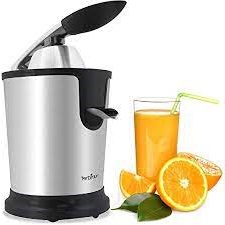
This electric citrus juicer is perfect for making fresh juice quickly and easily. The parts are dishwasher safe and easy to clean. Plus, it’s quiet and has a long cord for convenience.
However, the integrated filter is not always the best at catching pulp and seeds, which can end up in your juice. The spiral reamer is adequate for most fruits, but it may clog if you try to squeeze too much too fast.
Gourmia GMJ9970 Large Citrus Juicer
The Gourmia GMJ9970 Citrus Juicer is a great option if you’re looking for a manual juicer. It has a sturdy base and non-skid feet, so it doesn’t move around while you’re using it. Plus, the manual pull handle does all the work for you!
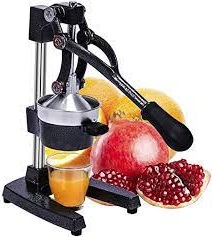
The Gourmia GMJ9970 Large Citrus Juicer is a great option for those who want an easy-to-use machine that can handle tough fruits like pomegranates, lemons, limes, and oranges. The juicer has a durable cast iron base and is made from durable materials, making it a long-lasting addition to your kitchen.
The Gourmia GMJ9970 Large Citrus Juicer makes your juicing experience better. The parts are made with surgical-grade stainless steel, making it easy to clean and dishwasher safe. In addition, it takes up very little counter space. Finally, it weighs only 15.3 pounds, making it easy to move around.
Hamilton Beach 932 Commercial Citrus Juicer
Hamilton Beach 932 is a commercial citrus juicer that is made with a premium metal finish and an acid-resistant coating. It is perfect for small kitchens. Its compact size makes it easy to store and easy to use in different locations.
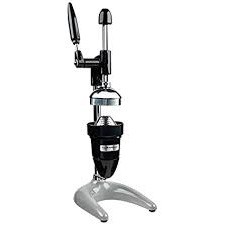
The Hamilton Beach 932 Commercial Citrus Juicer is a quality machine with many features to improve your juicing experience. For example, the sure-grip feet keep it from slipping while in use, and the stainless steel strainer, cone, and funnel are all included so you can get started juicing right away.
The manual pull level has up to 2,000 pounds of force, making it perfect for extracting juice from tough fruits. Additionally, the heavy-duty gears make it easy to extract juice quickly. Plus, there is a 7-year warranty against construction defects.
Slendor Commercial Citrus Juicer
The Slendor Commercial Citrus Juicer is made so that it is durable and can be easily operated with just one hand. This makes it perfect for busy people who want to make fresh juice without having to spend a lot of time in the kitchen.
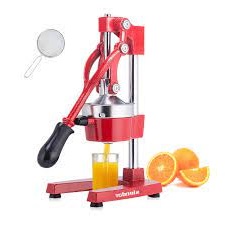
The Slendor Commercial Citrus Juicer operates efficiently. The manual lever can be used with just one hand, and the juicing pieces and funnel are made of stainless steel. In addition, the base is sturdy and durable, made from cast iron.
The juicer is easy-to-clean as there are removable parts that can be quickly taken off and washed in the sink. However, it’s important to note that this extractor can only be used with handwashing – so it can’t be put. Additionally, the juicer is durable and will keep all the pulp and gunk out of your juice, ensuring a smooth drink.
This citrus juicer is perfect for those who enjoy exotic or tropical fruits. With a gentle press of the handle, you can extract juice from any fruit. Additionally, the rubber legs prevent slipping and make it easy to use.
Breville BJE200XL Juice Fountain Compact
The Breville BJE200XL is made from stainless steel for longevity. In addition, it features a 3inch wide chute opening to juice whole fruits and vegetables with ease.
It is perfect for small kitchens and has a micro-mesh filter made from stainless steel. The juicer also operates as a blender, with a 25 oz container for juice and a 1.6 qt pulp container for fresh fruit beverages.
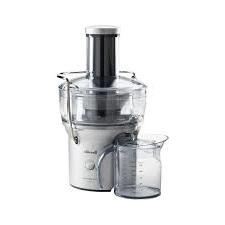
It is good for those who want an easy-to-store product. The power cord wraps under the base, so there’s no need to worry about tangled cords. Plus, the compact design consumes small counter space.
The Breville BJE200XL Juice Fountain Compact is ideal for those who prefer lower oxidation. It also includes a froth separator, so you don’t have to pour half your glassful down the drain when making delicious drinks like oatmeal porridge with freshly squeezed orange juice!
Zulay Fruit Manual Juicer (Best Handheld)
The Zulay handheld juicer is a great option for those who want a citrus juicer that is easy to carry around. It is also a good choice for those who want a manual model; this means that there is no electricity required.
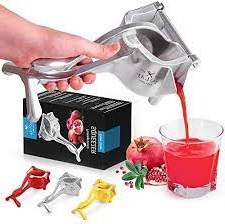
It is a handheld juicer with a huge slot for the fruit, so you can easily fit large pomegranates in there. However, you may need to slice your pomegranate in half or into smaller pieces to make sure all the seeds come out. Cleaning this juicer is simple; it just needs to be hand-washed. Plus, it’s made with heavy-duty materials so that it will last for years.
The Zulay handheld juicer is perfect for anyone who wants a quality juicer without taking up too much space. Plus, the compact design and easy-to-clean features make it a breeze to keep this juicer in top condition. And if there are any problems with your purchase, the no-hassle guarantee ensures that you’re always taken care of.
Colibrox Large Commercial Juice Press
This juicer is made of high-quality materials- stainless steel and cast iron. It is also not painted or coated with colors, so it will stay looking new for longer. The handle has an ergonomic rubber end which makes it easier to use when you are applying high pressure on the fruit pressers.
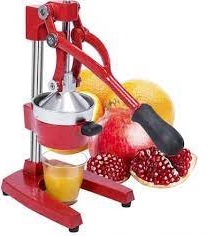
The Colibrox Large Commercial Juice Press is designed for those who are looking for a heavy-duty machine. It can handle up to 2,300 PSI and is made up of cast iron and stainless steel components. Additionally, the juicer doesn’t appear to be that striking with a rough matte texture.
The juicer is one of the top-rated pomegranate juicers on the market. It has an anodized top, making it more sturdy than other models. Additionally, the rubberized handles make them more convenient to use.
Even though the press appears to be strong, several significant quality control flaws were discovered. For example, when used with larger pieces of fruit, the gadget is unsuccessful at extracting all of the juice. The filter is also prone to clogging.
Rovsun Manual Juicer
The Rovsun Manual Juicer is made of high-quality iron and stainless steel materials. It also has a long handle which reduces the stress on your hand, and a lock to ensure safety when not in use.
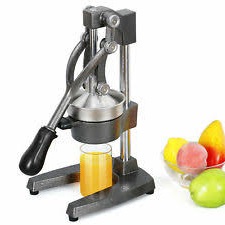
It is an affordable juicer, and it’s easy to use. You’ll just have to cut the pomegranate in half and place it onto the pressing plate. Plus, it’s easy to clean up (remove the strainer and funnel, then wash). However, it’s notorious for leaving the pulp behind, so avoid it if you want to avoid pulp!
The juicer is praised for its durable build, but it has been criticized for the amount of pulp left in the juice and its time to extract juice from fruits and vegetables.
ZENY Commercial Grade Juicer (Best Pomegranate Value Juicer)
The ZENY Commercial Grade Juicer is a great option if you’re looking for a pomegranate juicer that has detachable parts for easy cleaning, a filter set for separating flesh and seeds, and is made with stainless steel. It’s also a great value compared to other juicers on the market.
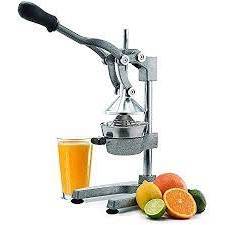
The ZENY Commercial Grade Juicer is a great option for those who are looking for a budget-friendly pomegranate juicer. It has a rubber grip that doesn’t put pressure on your hand, making it easy to use.
Overall, it is a great value compared to the price. It is affordable and has all of the features that you would want in a pomegranate juicer.
Excelvan Hand Press pomegranate Commercial Juicer
This Excelvan Hand Press pomegranate Commercial Juicer is a great option if you are looking for an easy-to-use and efficient citrus juicer. It requires no power or electricity, and it is perfect for squeezing pulpy fruits like pomegranates. Just cut the large fruit in half and push it through the juicer. The tough cast iron construction will last long.
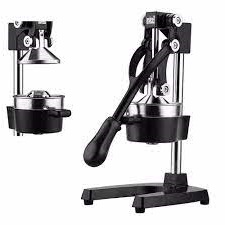
The pedestal is thick, and American FDA approved, while the gravity-aided squeezing technology makes it easier to extract juice from the fruit. This machine is easy to clean because of the strainer and cone removal process. In addition, the parts that need to be cleaned can be easily taken apart, so there is no need for a lot of time-consuming scrubbing.
Mueller Austria Ultra Juicer Machine (Best for Dual feed Chute)
Mueller Austria is a well-known brand for high-quality products, and this juicer machine is no exception. The dual feed chute allows you to juice whole fruits and vegetables with ease, and the three professional-grade inspections ensure that your juicer will last for years. The nickel color also makes it stand out from the crowd.
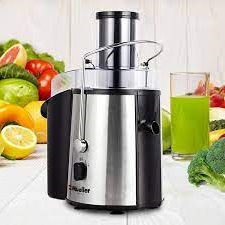
It has a feed chute that is about 3 inches larger than most other juicers, which reduces the prep time. The dual-feed chute also allows you to juice both hard and soft fruits and vegetables without having to change any parts.
It spins around at a speed of 60 rpm thanks to a patented mechanism. It means that your juice will contain the maximum amount of nutrients. There will be 60% more juice and 50% more vitamins and minerals. The juicer has a safety sensor button to provide a safer operation, which means that it aids in the prevention of accidents. The juicer will not start until all of the parts are correctly attached.
CO-Z Commercial Grade Citrus Juicer
The CO-Z Commercial Grade Citrus Juicer is perfect for any business or kitchen that needs a reliable and durable citrus juicer. It features an extra-long pull arm that can handle up to 2,300 PSI of pressure, ensuring that you’ll be able to juice even the hardest pomegranates.
This juicer is made of cast iron and stainless steel, making it durable and easy to clean. It’s also available in gray, black, orange, or red to match your kitchen decor.
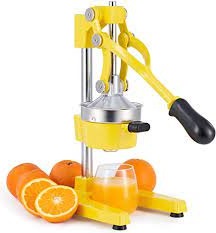
It is easily leveraged, and the stainless steel strainer removes most pulp and seeds. This makes it easy to get the most juice possible from your citrus fruits. The CO-Z juicer’s strainer, cone, and funnel are all removable and dishwasher safe. The entire structure is also simple to maintain. However, we did want to point out that you should be cautious when using the lever. Pulling down too forcefully and quickly may cause it to tip forward. Additionally, the rear side of the foundation tilts up slightly when it’s pushed all the way down, making it easier to get every last drop of juice from your fruit.
It performs well with pomegranates and other fruits, making it versatile for most juicing needs. It is a great option for those looking for an easy-to-use and effortless juicing experience.
New Star Foodservice Commercial Citrus Juicer
This juicer is made of 18/8 steel construction. The thick rubber grip can bear a force of 2,300 PSI, making it very durable and comfortable. In addition, it has a powerful platform and sticky feet to provide optimal security and stability throughout the operation.
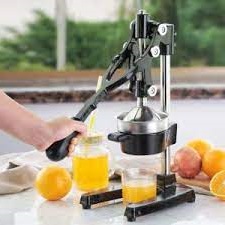
This juicer is easy to use; all you have to do is put in the citrus fruit and press the lever. Cleanup is a breeze as it is dishwasher safe. Plus, the juicing process remains stable, so you’ll get more juice out of your fruit.
Omega Juicer J8006HDC
The Omega J8006HDC is a high-quality yet affordable juicer that has many of the same features as more expensive models. The primary difference is that it has a motor with less power, and it doesn’t come with conversion attachments. However, the 3-stage masticating auger still turns at 80 RPM, so you can be sure your juice will be made with care.
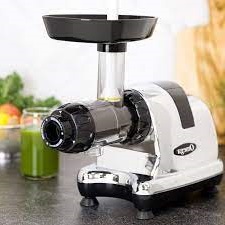
It is a powerful juicer with a 200W motor that helps it process harder ingredients. However, its food chute is smaller than the one found on the NC800, so it can’t make as much at once. Additionally, this juicer can make sorbets, breadsticks, nut butter, baby foods, and pasta.
The parts that contact with the juice are BPA-free, so you don’t have to worry about harmful chemicals entering your food. Additionally, the dishwasher-safe parts make it easy to clean the juicer. However, its smaller food chute can be more difficult to prep when not juicing pomegranates.
Jocuu Slow Masticating Juicer
The Jocuu Slow Masticating Juicer is a basic, entry-level juicer that isn’t as powerful as more expensive options. However, it can still be used to juice pomegranate seeds without difficulty and gives a decent juice yield.
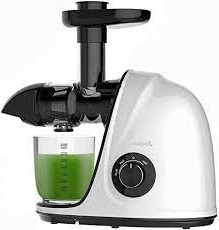
While the food chute is relatively small, it can fit into the juicer. The Jocuu also comes with tools to clean the juicer. The juicer separates the juice from the pulp. The juicer also has a reverse function to help with cleaning and unclogging the machine. The strainer is harder to clean, but other parts are quick to wash.
Hurom H-AA Slow Juicer
The Hurom H-AA Slow Juicer is a top-quality product that comes with many features that make it a great choice for anyone looking for a new juicer. It operates at 43 RPM to avoid heat friction, meaning the juice will be carrying its natural flavor and delicious taste. It also has a stylish modern design.
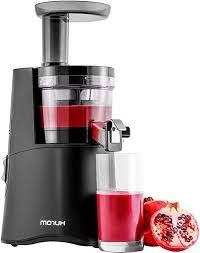
The juicer is a great choice if you want to be able to control the pulp and foam according to your preference. Additionally, it excels in its versatility – you can make all sorts of different juices with it.
The Hurom H-AA Slow Juicer features a slow speed to protect the motor from heat and an enhanced working capacity. Its dimensions are 7.1 x 8.8 x 16 inches. The machine can handle a variety of tasks. It’s perfect for juicing pomegranates but also great for making combinations of different fruits and vegetables. Plus, the juicer is easy to clean and assemble, so you’ll be able to start using it right away.
KOIOS Juicer Machine
KOIOS Juicer Machine can be used to extract fibrous fruits and vegetables. It operates quietly so as not to disturb those around it, making it perfect for use in the home.
It’s easy to use and clean, and it comes with all the attachments you need to get started.
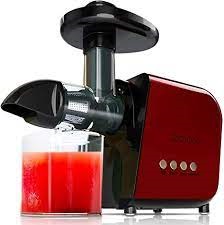
The advantage of a slow juicer over a centrifugal juicer is that it does not destroy any minerals, enzymes, vitamins, or trace minerals found in produce.
Nemco 55850 Manual Heavy Juicer
The Nemco 55850 Manual Heavy Duty Juicer is a high-quality product with many features. It has a 20:1 mechanical advantage, meaning that it requires very little effort on your part to extract juice from fruits and vegetables. Additionally, it features self-lubricating strong bronze bearings that will keep it running smoothly for years to come.
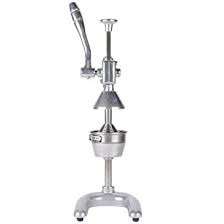
The high-strength steel post provides more rigidity, while the ergonomic handle makes it easy to grip. It is also well designed, making it easy to use due to the removable strainer, cone, and cup.
LavoHome Press Juicer (Most Budget-Friendly)
The LavoHome Press Juicer is a budget-friendly option that has a long rubberized handle. This makes it easier to use and helps to prevent any accidental slips. It is made of cast iron, making it very durable. Additionally, the juicer has a press force of 1.400 pounds per square inch maximum- meaning that it will not move or wobble when in use.
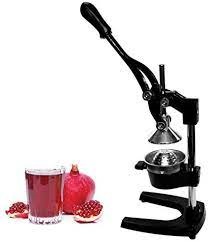
The LavoHome Press Juicer is a medium-priced manual juicer that gets the job done without any fuss. It’s a great option for budget-minded consumers who don’t want to worry about their juicer breaking or not working well.
Additionally, it can handle most medium-sized pomegranates without any problem. However, if you have a large pomegranate, be aware that it may be unstable during the juicing process. It is also heavy-duty and easy to clean.
Commercial Grade Can-Can Pomegranate Juicer (Most Durable)
This juicer is made entirely of stainless steel, making it incredibly durable. It is also a commercial-grade juicer, meaning that it has a robust and well-built body that can handle heavy use.
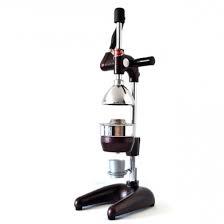
It has a solid foundation that will not budge even if you apply pressure, meaning you can juice with ease. In addition, it requires physical effort to extract your favorite beverage; the more you put in, the more you get out!
This juicer is perfect for those who want to maximize the fiber content in their juice. It extracts 95% of the pomegranate juice, so you’re getting the most benefit possible from this fruit. Additionally, it can be used for other citrus fruits as well.
The lever on top makes it easy to extract the juice and a large bowl. Plus, it’s incredibly durable and stable, so you can juice confidently. This juicer is one of the most expensive on the market, but it is also the most durable. It features a unique design that smashes into the fruit and juices them easily.
Focus Foodservice Juice Press
The Focus Foodservice Juice Press is a great option if you are looking for a quality juicer that can handle pomegranates. It is more expensive than some of the other models out there, but it has received high marks from users and is well worth the investment.
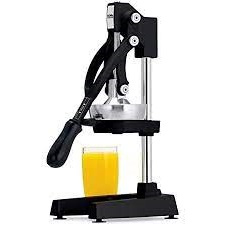
The Focus Foodservice Juice Press is sleek and reliable, making it quick and easy to work with. It’s perfect for busy restaurants that want to offer their customers fresh juice made from whole fruits and vegetables.
It has a commercial-grade build that makes it tough enough to handle the pressure, and it also comes with a suction base to keep it in place on countertops. Plus, the ergonomic handle ensures that you’ll be able to get the maximum amount of juice out of your fruit.
With this juicer, you can make more juice with less effort. In addition, there is no need to put in extra work to get the most out of your produce. Simply use the pomegranate juicer and let it do all the work for you.
AMZCHEF Slow Juicer
The slow juicer is the perfect choice for those who want to make delicious, healthy drinks in seconds. Its upgraded spiral system reduces waste by up to 80%. Plus, it doesn’t produce as much foam or pulp as other juicers, so that you can enjoy each juice with ease.
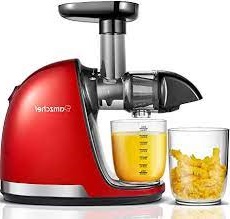
AMZCHEF benefits from cold press technology to extract the most juice possible with little oxidation, and this means that the juice will have a higher quality and last longer. In addition, the juicer is quick and easy to use, making it perfect for busy people who want to make healthy juices at home.
The juicer has a low-speed motor and fine grinding to preserve the nutrients in fruits and vegetables. As a result, up to 90% more growths are retained, making it one of the best pomegranate juicers on the market.
It has a 7 segment spiral design that helps in extracting maximum juice while retaining the nutrition content. Additionally, it is easy to assemble and comes with intelligent protection chips for safety assurance.
Bnunwish Pomegranate Juicer (Best Personal)
The Bnunwish Pomegranate Juicer is a great choice if you’re looking for a smaller, more portable juicer. It’s one of the most affordable on markets. It is perfect for personal use; it is small and light, so it’s easy to take with you on camping vacations, trips, or picnics. Plus, the juicer is dishwasher safe, so cleanup is a breeze.
The Bnunwish Pomegranate Juicer does not require electricity and is very portable, which means you can take it with you everywhere you go without worrying about finding an outlet. Additionally, the juicer has no drawbacks, as it is so portable. However, the main disadvantage is that you must first deseed the pomegranates before using the juicer.
Gowintech Commercial Heavy Duty Hand Press Juicer
The Gowintech Commercial Heavy Duty Hand Press Juicer is a budget-friendly option for those looking for a 15-inch juicer. In addition, this juicer has high ratings and is highly durable.
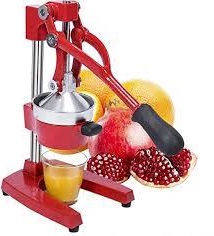
This juicer is made of high-quality stainless steel and solid cast iron. It is durable and easy to clean. The heavy-duty hand press juicer is perfect for extracting juice from pomegranates.
This juicer is easy to press and clean – the parts are dishwasher-safe. It is also strong and sturdy, making it a good option for those who want a durable juicer. This machine is made with a built-in extractor, stainless steel body, and cast iron platform – ensuring that your juicing experience is easy and efficient.
Cilio Juicer
The Cilio juicer is a popular choice for juicing pomegranates. It is often considered one of the best options because it is simple to use and extracts the most juice from pomegranates.
The Cilio Juicer is designed with a longer handle, making it possible to squeeze more power out of the fruit. In addition, the juicer is easy to clean up and helps absorb maximum juice from pomegranates.
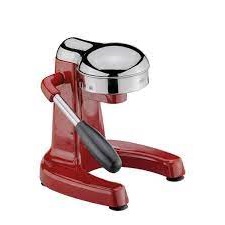
The stainless steel strainer cup and funnel make it easy to juice without having to worry about the pulp getting stuck. Additionally, every other part that can be removed is dishwasher safe, making it easy to keep your juicer clean. To use, place the container in the base and press the handle downwards. The juicer is manufactured in Germany and is known for its high-quality products.
Pomegranate Juicers Buying Guide
Pomegranates are a delicious and nutritious fruit, but they can be tough to juice. In this section, we will give you some tips on choosing the right pomegranate juicer for your needs. We will also discuss what to look for when buying other juicers. Remember that you may use your juicer for more than just pomegranates, so choose wisely!
Quality
Pomegranates are one of the most difficult fruits to juice because of their tough skin and hard seeds. For this reason, it is important to find a quality pomegranate juicer that can handle the job. Otherwise, you may end up with a juicer that is unable to extract all the juice from the fruit or that leaves behind seeds in your drink.
When you are choosing a juicer, it is important to watch the quality. Some juicers are not as durable and will break down quickly. Others have removable parts that can be difficult to clean. Make sure to choose a juicer that is high quality and will last.
The two best materials for durability are stainless steel and cast iron. Stainless steel is resistant to rust, while cast iron retains heat well, meaning that less juice will be lost in the juicing process. Plastic juicers might not be good enough, and they might break down quicker than metal ones.
Stability
When it comes to choosing a product, it’s important to consider its features and how long it will last. A stable and durable product will provide you with years of faithful service.
A pomegranate juicer should be stable on the countertop; otherwise, it will move around while you’re using it and could end up spraying juice all over the place. Additionally, since pomegranate juice is a bit more difficult to make than other juices, the juicer will be under a lot of pressure and working extra hard. Make sure to buy one that can handle the extra stress!
Be that as it may, you have to be careful with manual juicers because the handle can make them unbalanced. If you’re not careful, you might end up spilling your juice all over the place. Thankfully, it’s easy to clean when you use pressure on the handle- just make sure to do it right after using it, so the pulp doesn’t dry and becomes harder to get rid of.
Easy To Use
First and foremost, a juicer should be easy to use. This means that it is simple to assemble and disassemble, has an easy-to-grip handle, and doesn’t require too much pressure or force to extract the juice from the fruit. Additionally, the juicer should be easy on the eye, with a sleek design that will complement any kitchen.
Another thing to watch for is whether it separates the seeds from the pulp or not – if you want to avoid getting bits of fruit in your juice, make sure it does this properly to avoid having to do the work yourself.
Durability
Durability is an important factor to consider when purchasing a pomegranate juicer because you want one that will be able to exert enough force to extract the juice from the fruit.
When it comes to durability, stainless steel and cast iron juicers are the best options. They will last for years without any problems.
Handles and Cones
Pomegranate juicers are designed to require less force to operate, making them easier for people to use. This is beneficial because it means that more people will be able to extract juice from pomegranates and enjoy its benefits.
Make sure to check the comfort and grip of the handles. Additionally, make sure that the cones are non-slip as well. This will ensure that you can juice your fruit with ease and without any accidents.
The handles should be made of a sturdy material so that the fruit doesn’t slide off while it’s on the cone. Additionally, you’ll want to make sure that the cone is made of stainless steel in order to ensure durability during juicing. This will help get all of the individual seeds out of the fruit.
Funnels and Filters
When looking to buy a pomegranate juicer, be sure to choose one that does not get clogged easily. This will save you frustration and time on the long run. In addition, it would be best if you used a juicer that has a good filter. This will ensure that there is not a lot of seed foam, pulp, or skin in your juice.
A juicer’s performance depends on the funnels and filters. If these parts are not well-functioning, the juicer will not work as efficiently. So make sure to check these components before purchasing a juicer to ensure you get the most out of your machine.
Size
A tall juicer is the best option for those who are looking for a space-saving and easy-to-handle model. It will be easier to store in your kitchen, and you will not have any trouble using it.
The space-saving juicer is easy to handle because it has a narrow structure. This means that it won’t take up a lot of counter space in your kitchen and is easy to move around.
If you are short on space or want a model that is easy to handle, then go for a slim juicer.
Easy in Cleaning
After juicing, make sure to clean the machine thoroughly. Not cleaning the machine can cause it to break down and will affect its performance. Pomegranate juicers are easy to break down and assemble. You must consider a juicer that is dishwasher safe. This will save you time and hassle when it comes to cleaning up after juicing.
Electric and Manual
There are two types of juicers: manual and electric. The type you purchase is based on your personal preferences. Some people prefer the ease of use that comes with electric juicers, while others appreciate the lower price and smaller size of manual juicers.
However, electric juicers are not as effective as manual citrus juicers when it comes to extracting juice from pomegranates. This is because the seeds tend to get stuck in the electric juicer’s strainer, while the manual citrus juicer has a more pointed strainer that is specifically designed for pomegranates.
On the other hand, electric juicers are great for extracting juice from hard fruits and vegetables. However, they may not be able to extract juice from citrus fruits as easily as manual juicers.
Juice Yield
When purchasing a juice press, it is important to consider the juice yield. This is the amount of juice that the press can produce from a given fruit or vegetable. A high juice yield means that more juice can be extracted from each piece of produce, making the purchase worth it.
The price of the pomegranate juice machine is not always in line with the juice yield it produces. Inexpensive machines may produce a lower quality juice, while more expensive machines will have a higher yield. Therefore, it is important to consider how much juice you will need and how often you will be using the machine when making your purchase.
Some companies boast a higher yield than others, so it’s important to do your research before settling on a purchase from a company. Additionally, the type of fruit you’re using will also affect how much juice you get out of it.
A 25% to 30% difference in the amount of juice yielded from pomegranates can be found with different juicers. To get the most juice possible, it is important to select a juicer that has been designed specifically for pomegranates.
Noise Dampening
There are a few different designs of quiet juicers on the market. Some are designed to reduce noise by using a specific type of blade, while others use a different method that is quieter for extracting juice. Ultimately, it is important to find a juicer that meets your needs and fits within your budget.
Feeding Chute
If you’re looking for a juicer, make sure to check the size of the feeding chute. If it’s small, you won’t be able to extract maximum juice since most of the fruit will have to be chopped up into small pieces first.
If you’re having trouble with your pomegranate juicer, try splitting up the fruit into four or five different portions. This will slow down the speed at which the machine processes the fruit and make it easier to extract all of the juice.
How to Make Pomegranate Juice
Making pomegranate juice is a process that takes about 30 minutes. The result is a delicious drink that all can enjoy.
Ingredients
For this recipe, you’ll only need 5 to 6 large pomegranates to serve 4 cups.
Preparation
- Remove the crown-shaped part of the pomegranate with a paring knife.
- The pomegranate should be cut into sections.
- Cut the pomegranate into sections.
- Put cold water in a large bowl halfway. Under the water, separate the pomegranate arils.
- It keeps pomegranate juice from squirting all over the place.
- When you’re finished separating the pomegranate arils from the rind, drain the water from them.
- Blend the arils in a blender until all of the arils are crushed, but the majority of the seeds are still intact. This usually takes between 15 and 20 seconds.
- Using a strainer, strain the juice. Because the pulp is quite thick, the juice will pass through the strainer very slowly. Press the pulp against the strainer with a rubber spatula to speed the process up. The juice should flow more quickly.
- To serve, pour the juice into a glass. 5–6 large pomegranates should yield approximately 4 cups of juice. Leftover juice can be stored in a jar in the refrigerator for 5 to 6 days.
Health Benefits Of Pomegranate Juice
In particular, pomegranate juice is known for its health benefits. To get the most benefit from pomegranate juice, you have to drink it moderately. However, let’s talk about the health benefits of pomegranate juice one by one:
Antioxidants
Not only does pomegranate juice have three times the antioxidants like green tea and red wine, but it also helps improve heart health. The antioxidants in pomegranate juice help to improve blood flow and lower bad cholesterol levels while raising good cholesterol levels.
Free radicals are unstable molecules that can damage cells, and over time this damage can lead to inflammation. Pomegranate juice is high in antioxidants, which scavenge these free radicals and protect cells from damage.
The antioxidants in pomegranate juice have been found to stall the progress of Alzheimer’s disease and protect memory. Researchers believe that these antioxidants work by reducing inflammation in the brain, which is a key factor in Alzheimer’s development.
Vitamin C
When it comes to juice, the best option is always fresh juice. This is because pasteurization breaks down the nutrients in the juice, making them less available to your body. So make sure you’re getting all the benefits of pomegranate by drinking freshly squeezed juice.
Pomegranates are a great source of Vitamin C, which is an essential nutrient for the body. It helps keep our immune system functioning properly and can help us recover from sickness faster.
Digestion
There are many health benefits of pomegranate juice. For example, it can be helpful for people with Crohn’s disease, ulcerative colitis, and other correlated bowel problems.
Pomegranate juice is also a rich source of antioxidants which help to protect the body against free radicals.
This fruit juice can also be beneficial for those who have digestion problems. It can help with constipation, diarrhea, and other issues related to the digestive system.
Arthritis
Arthritis is a degenerative joint disease that affects millions of people. While the root cause of arthritis is still unknown, current studies are being undertaken to determine the effects of pomegranate juice on rheumatoid joint arthritis, inflammation, osteoporosis, and other types of arthritis.
Preliminary research suggests that pomegranate juice may help reduce inflammation and pain in people with arthritis.
Pomegranate contains high levels of flavonols, which have been shown to block inflammation. This makes them a possible treatment for arthritis.
Heart Disease
Pomegranates are good for heart health because they protect the arteries and the heart. The juice can improve blood flow and keep arteries from becoming thick and stiff.
Related article: top juicers for traveling
Furthermore, it prevents cholesterol buildup and plaque formation in arteries. However, it is best not to combine pomegranate juice with statin medication because it may cause adverse reactions.
Antiviral
Pomegranates contain vitamin C and a variety of immune-boosting nutrients such as vitamin E. These vitamins help fight off a variety of infections caused by viruses and bacteria.
General Facts About Pomegranate
Pomegranate is actually an apple with many seeds. Although it is best juiced in citrus juicers, it is technically a berry. Additionally, this fruit is mentioned in theology books more than any other.
Punicalagin and punicic acid are the two compounds found in the fruit. They are in charge of the health benefits we receive. Its antioxidant, anti-viral, and tumor-reducing properties have made it one of the world’s healthiest fruits. In addition, pomegranate contains vitamins C, A, E, and folic acid.
Pomegranates contain three times the antioxidants found in wine and green tea. There is no cholesterol or saturated fat in it. Additionally, pomegranates have many health benefits that include reducing the risk of heart disease and cancer.
Pomegranates are a fruit that is native to the Middle East but can now be found all over the world. They are interesting because they can live for up to 200 years, and each one contains about 1,000 seeds. You can store them in the fridge for up to two months.
FAQ’s
Have some questions about pomegranate juice? Check out this collection of frequent questions about pomegranates:
What are the health benefits of pomegranate juice?
Pomegranate has different health benefits. The fruit is high in antioxidants that help protect the body from free radical damage. Pomegranate juice also has anti-inflammatory properties, can help to improve heart health, and protects against the aging process.
Pomegranate juice is packed with antioxidants like Vitamin C, which protect cells from harm and prevent diseases like cancer. Pomegranate juice helps protect the heart from damage, reduces blood pressure, and helps control blood sugar levels in people with diabetes.
How many calories are in pomegranate juice?
Pomegranate juice is a healthy drink that is low in calories. It has about 140 calories per cup.
Is a juicer required to juice pomegranates?
You don’t necessarily need a juicer to make a pomegranate juice. However, in order to get the most juice from a pomegranate, it is recommended that you use a juicer.
Pomegranates can be juiced with a blender or even with your hands. If you are using a blender, make sure to cut the pomegranate in half so that the seeds are exposed. If you are using your hands, smash the pomegranate against a hard surface and then use your fingers to extract the juice.
The simplest way to extract the juice from pomegranate is by using a juicer it is clean because there is no waste or mess. The juicer also separates the seeds from the juice, so there is no need to filter them.
What are the steps in using a pomegranate juicer?
There are a few simple steps in using a pomegranate juicer. First, cut the pomegranate in half with a sharp knife. Then, place the fruit in the juicer and squeeze. The juice will come out quickly, so be prepared!
For some other juicers, to make Pomegranate juice, you must first remove the seeds from the fruit. Then, cut off the top of the fruit and cut it into small pieces. Finally, put the pieces into the juicer and enjoy your fresh juice!
When should pomegranate juice be consumed?
Fresh pomegranate juice is a great way to start the day. In addition to being a delicious fruit, pomegranates are packed with essential nutrients and vitamins.
According to health experts, pomegranate juice should be consumed early in the morning on an empty stomach is the best way to experience these benefits, as it will be absorbed quickly into the bloodstream.
Drinking pomegranate juice before bed-time, too can help flush toxins out, allowing the body to rest and repair while you sleep.
How long does homemade pomegranate juice last?
If you’ve recently squeezed some fresh pomegranate juice, it will typically last in the fridge for 3 to 5 days. However, if you want to store it for a longer period of time, you can freeze it and it will last up to 6 months.
Can I drink too much pomegranate juice?
Pomegranate juice is generally safe to drink, but it is possible to consume too much. Therefore, it is important to be aware of how much you are drinking and to stop if you feel sick.
The American Dietetic Association recommends only drinking pomegranate juice twice a day. Excessive consumption can result in adverse effects such as diarrhea and abdominal pain.
Pomegranate juice is a rich source of antioxidants, beneficial for the body. However, those allergic to Pomegranate may experience itchiness, irritation, difficulty breathing, and other issues. It is important to consult a doctor before consuming large quantities of pomegranate juice if you suspect that you are allergic to it.
Do I have to peel the pomegranate before juicing it?
There are two thoughts on this matter. First, some people say that it’s better to peel the pomegranate before juicing in order to avoid a bitter taste in the juice. Others believe that juicing with the peel on will give the drink more nutrients.
However, there is no right or wrong answer – it all depends on your preference and what you’re looking for in terms of taste and nutrition.
How many pomegranates do I need to make a bottle of juice?
There is no one sure answer to this question since the amount of juice you collect in the bottle depends on the size of fruit you are using. However, it should take about five medium-sized pomegranates, and approximately 8-10 small pomegranates to make a bottle of juice.
Is it good If I drink pomegranate juice every day?
Yes, it is good to drink pomegranate juice every day. Pomegranate is a fruit that is full of antioxidants, vitamins, and minerals that are essential for our body.
Recently, a survey found that drinking pomegranate juice daily has many health benefits. For example, it lowers blood pressure, enhances cholesterol levels, and purifies plaque from the blood vessels. All of these effects work together to keep the body healthy and functioning properly.
It is a great addition to your diet. It’s low in calories and high in nutrients, making it the perfect fruit to add to your day.
Can I juice pomegranates whole?
Pomegranates are a delicious fruit that can be enjoyed in many different ways. One of the easiest and most popular methods is to juice them.
Contrary to popular belief, you do not need to cut the fruit in half or quarter it in order to juice it – you can simply cut off the top and squeeze the fruit out like you would any other citrus fruit.
Some devices will have you cut the fruit into quarters in order to extract the juice. However, some devices allow you to juice a pomegranate whole.
What is the side effect of pomegranate juice?
Pomegranate juice is a healthy drink that has many benefits, such as reducing the risk of heart disease and cancer. It is also known to have no side effects, but sensitive individuals may experience nausea or dizziness.
If you are looking to drink pomegranate juice for its health benefits, make sure to do so at mealtimes. Drinking it after meals will help your body absorb the nutrients better and give you the most benefit.
Pomegranate juice is a rich source of Vitamin C. Too much of this vitamin can lead to scurvy, a disease that causes weakness, gum disease, and skin lesions. Additionally, too much Vitamin C can cause diarrhea.
Pomegranate juice may have some side effects for pregnant women. It increases the blood circulation rate, which may cause excessive bleeding from a miscarriage. Additionally, pomegranate juice is high in antioxidants, which can be harmful to unborn babies.
Suppose you are on any medication that affects your blood clotting ability. In that case, it is best to avoid pomegranate juice because it can have some adverse effects if you have bleeding disorders or are taking blood thinners. Pomegranate juice is also not recommended for individuals with kidney disorders.
Conclusion
With our buying guide and pomegranate information we introduced, I hope this article has helped you choose the suitable juicer for you. There’s no perfect choice with all the options on the market as it varies depending on your preferences. However, those were our top picks for you after reviewing over 100 pomegranate juicers.

